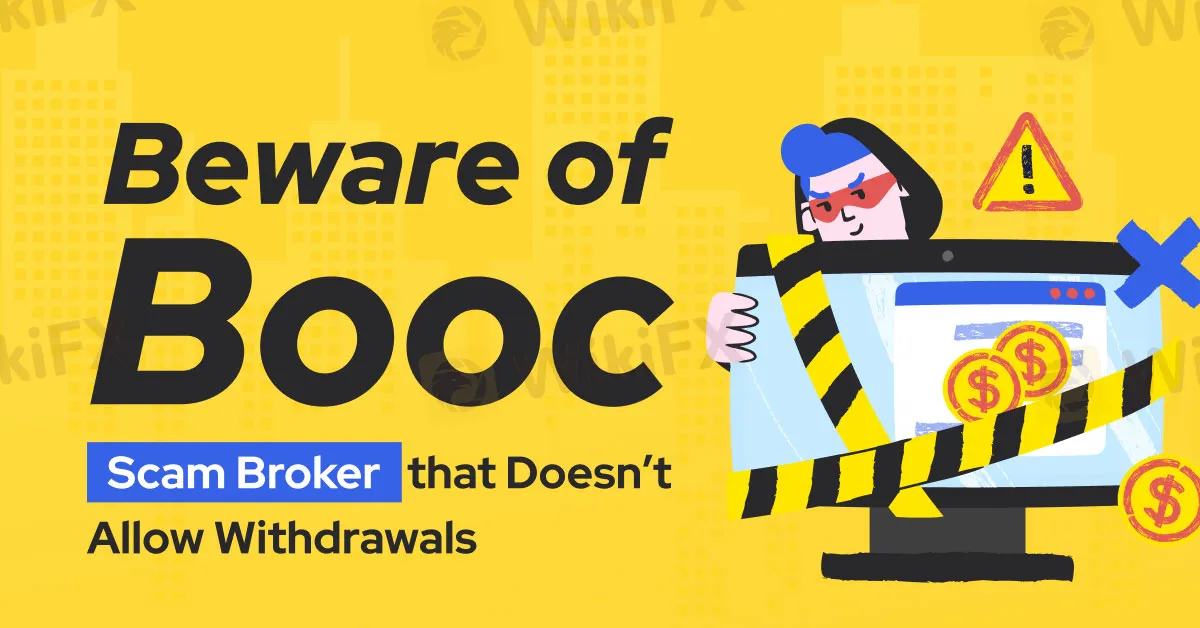简体中文
繁體中文
English
Pусский
日本語
ภาษาไทย
Tiếng Việt
Bahasa Indonesia
Español
हिन्दी
Filippiiniläinen
Français
Deutsch
Português
Türkçe
한국어
العربية
Beware of Booc | Scam Broker that Doesn’t Allow Withdrawals
Abstract:Nigerian trader Ismail A. falls victim to a crypto scam that vanishes his $210,000 through the unregulated broker Booc - a cautionary tale for anyone lured by online fortunes.

In a heart-wrenching account, Nigerian trader Ismail A. has shared his devastating experience of falling victim to an elaborate investment scam orchestrated by a group posing as Martin Currie Global Private Equity Fund. Ismails story highlights the dangers of fraudulent crypto trading platforms and the severe consequences they can have on unsuspecting investors.
The scam began when Ismail encountered an advertisement on Facebook for Martin Currie Global Private Equity Fund, a supposed subsidiary of Franklin Templeton. The fraudsters operated through a WhatsApp group and a website, www.boocfx.com, as well as an Android app named RGNT TGFR. Ismail was lured in by the promise of significant returns on investments in cryptocurrencies, specifically KPC coin.
The WhatsApp group was managed by three administrators: Mr. Michael Miller, Mr. Tom, and Mr. Martin, along with an assistant, Ms. Ellie. After joining the group in late March 2024, Ismail was guided by Ellie to create an account with the online broker Booc and credit his wallet with USDT. Despite initial losses due to self-trading, he was assured by Ellie that following their signals would lead to profit.

On March 28, 2024, the group announced a special trade signal called LAYOUT, requiring a minimum of 10,000 USDT. Encouraged by promises of high returns, Ismail deposited 18,000 USDT. However, following a regular trade signal, he lost all his funds.

Pressured by the group to deposit more money to recover his losses and join the LAYOUT, Ismail borrowed and invested further, only to face repeated liquidation of his funds.
Despite being assured of compensations and larger profits if he continued to deposit more money, Ismail found himself in a cycle of constant pressure and threats. He was manipulated into borrowing large sums of money, at one point amassing an investment of 210,000 USDT, only to see his account repeatedly drained by the fraudsters.
The scammers continued to exploit Ismail's trust, persuading him to sign a cooperative trade guidance form and promising him significant profits. However, every attempt to withdraw funds was met with new demands for more deposits or fabricated excuses, culminating in a final balance of $4,000,000 on his account which he was unable to access.
In a final blow, when Ismail sought to withdraw $900,000, the scammers demanded a 20% commission to be paid from external sources.

Unable to meet this demand, Ismail's account was ultimately emptied, with the scammers claiming they had donated the funds to charity due to his failure to pay the commission. When Ismail learnt about this, he lashed out at the scammers but in turn was blamed and threatened by them.




A desperate Ismail reached out to Martin Curries legitimate representatives via LinkedIn, who confirmed that their company does not conduct business through WhatsApp or similar platforms. Realizing the full extent of the scam, Ismail was left financially and emotionally devastated with a cumulative loss of $210,000.
Ismails tragic experience underscores the importance of vigilance and due diligence in the trading world. Investors are urged to verify the legitimacy of trading platforms and avoid engaging with entities that operate through unconventional means such as WhatsApp or obscure websites. Had Ismail conducted a background check on Booc through WikiFX, he would have been able to save himself from falling into this investment trap, as it is evidently stated on WikiFX that Booc is a suspicious and unregulated broker with low credibility.

This incident serves as a stark reminder of the potential dangers in the world of online trading and the need for robust safeguards to protect investors from such fraudulent schemes.

Disclaimer:
The views in this article only represent the author's personal views, and do not constitute investment advice on this platform. This platform does not guarantee the accuracy, completeness and timeliness of the information in the article, and will not be liable for any loss caused by the use of or reliance on the information in the article.
Read more

XTB Hack 2025: Major Security Breach Exposes Client Accounts
XTB suffers a major hack in 2025, with hackers draining client accounts and sparking urgent security upgrades. Learn how the breach unfolded and what’s next.

XTB Hack 2025: Major Security Breach Exposes Client Accounts
XTB suffers a major hack in 2025, with hackers draining client accounts and sparking urgent security upgrades. Learn how the breach unfolded and what’s next.

Want to Succeed in Forex? Start with the Right Trading System
If you want to trade currencies and make money in the long run, you need a good forex trading system. Many new traders enter the market without a clear plan. Some rely on luck or tips from others. But trading without a system often leads to losses.

Mumbai Police Nabs Black Paper Dollar Conversion Forex Scam Perpetrators: Check Out the Details
The crime branch of the Mumbai Police has nabbed a racket involved in duping people by claiming to convert black paper into dollars. Check this unique 24.7-lakh scam story.
WikiFX Broker
Latest News
What is a Pip in Forex?
New to Forex Trading in India? Here's How You Can Start and Maximize
FXTRADING.com: A Closer Look at Its Licenses
xChief: A Closer Look at Its Licenses
Intel spins out AI robotics company RealSense with $50 million raise
Risk Involved with Cabana Capital – Every Trader Should Know
Tom Lee's Granny Shots ETF is crushing the market and raking in cash
XTB Hack 2025: Major Security Breach Exposes Client Accounts
Nvidia's Jensen Huang sells more than $36 million in stock, catching up with Warren Buffett in net worth
These are America's 10 weakest state economies most at risk in a recession
Currency Calculator


